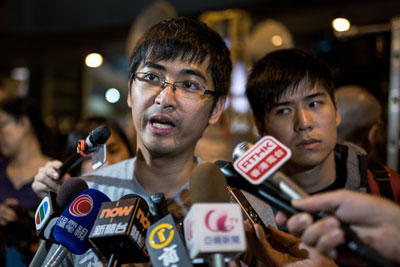Hong Kong’s pro-democracy protests are among the best covered in history. The city is saturated with print, broadcast, and social media, traveling across some of the best networks on earth. Its citizens are among the most connected in the world. And for all the media’s flaws, consumers expect them to deliver.
With the street demonstrations grinding into their third week, the media have become actors in the confrontations, or at least targets. The Hong Kong Journalists’ Association has been issuing a steady stream of updates, complaints, and statements that will ultimately serve as a history of the role of the media covering the demonstrations. Most of them are posted first in Cantonese, followed several hours later by English versions.
The most recent, “Six press unions complain against police over use of force against journalists,” is full of factual detail and criticizes the police for their “relentless behavior” in driving media away from the events they are covering. HKJA also publicized staff complaints from TVB, a major broadcaster, whose management they say censored coverage: “Seven News Unions throw their weight behind TVB journalists.” At issue was how upper management softened the language used to describe field footage showing six policemen attacking a protester on Tuesday. The coverage resulted in some of the police involved in the attack being removed from duty.
If it did soften its coverage, TVB might have just been reading the writing on the wall. The BBC’s English-language site was blocked in China soon after it posted the video, an act of “deliberate censorship” the BBC said. The BBC would know–its Chinese-language news website has been blocked pretty much since it was launched. “BBC World TV–as with all overseas broadcasters–suffers intermittent blackouts particularly when reporting China stories,” the broadcaster said.
For their part, the press freedom committee of the Foreign Correspondents’ Club of Honk Kong issued a statement today, reminding the government that “reporters, like all citizens, rely on the police for protection. The right to a free press and to free expression are constitutionally guaranteed here. We fully expect the neutrality and professionalism for which Hong Kong police have been renowned. We call on the police force to respect the duty of journalists to carry out their professional duty to report these events free of interference and harassment.”
Hong Kong’s Cantonese tabloid Apple Daily, which had had access to its building blockaded for two days by pro-China protesters, says its website is under constant attack. Tuesday, spokesman Mark Simon told a reporter who has been working with CPJ, “More disturbing to us than the street protests is the continued denial of service attacks on our website. At times they bring down our website for up to an hour.”
Who is carrying out the attacks? “We always had a good firewall, which we have improved upon. That makes us think the attacks on us are of a governmental scale. Our audience tends to be local and across the border. We certainly believe attacks are coming from the entity that would most benefit from silencing Next Media [Apple’s parent company]. That’s what we’ll say on the matter,” Simon said.
While there is a lot of global sympathy for the people in the streets in Hong Kong, mainland media, and much of their audiences, are not as pleased with what is taking place. The mainland media regularly defend police actions. If you do not read Chinese, you can get a sense of how the demonstrations are been reported by the government by checking out China Daily, an officially sanctioned English-language newspaper. Tellingly, the paper reported on mainland Chinese reporters being harassed and intimidated by demonstrators. The account of unfair treatment rings as true as those publicized by HKJA.
